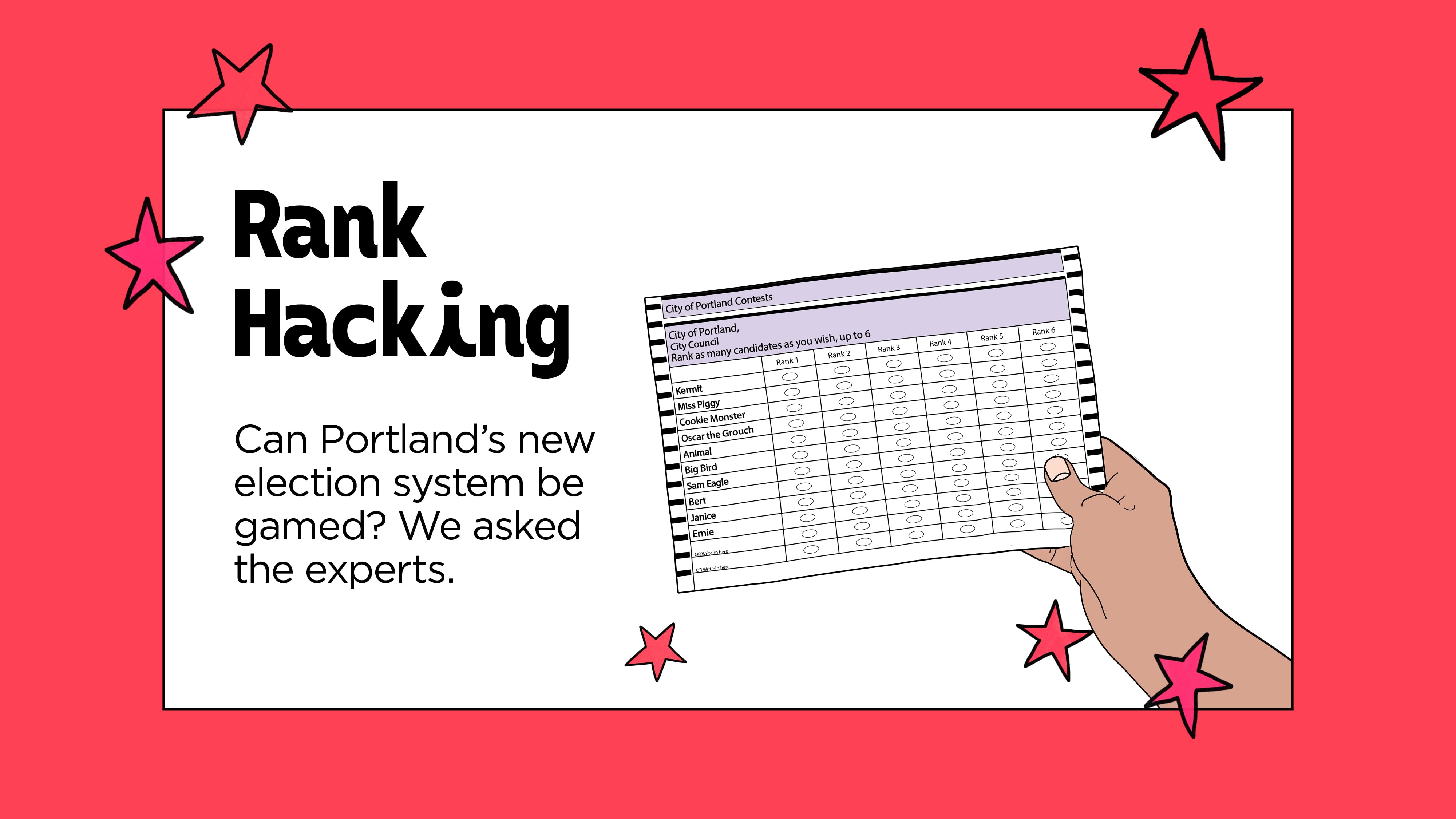By the end of this month, we will know how many people are running for Portland’s new and improved City Council. So far, there are more than 80 candidates, and the number grows by a few more every week. The deadline to file is Aug. 27.
Why so many? Because the council is growing from five (including the mayor) to 12, with three in each of four new districts. The new job pays $133,207 and comes with an office and staff. Why not throw your hat in the ring?
The question in any campaign is how to win. With ranked-choice voting and multimember districts, that question becomes a puzzle. To recap, RCV means you’ll rank up to six candidates in your district. After lots of computerized counting, three will win and serve together.
The most common question we get here at Ballot Buddy is whether the multimember RCV system can be gamed. After weeks of taking on easier queries, we now take aim at the elephant in the room. Here are some strategies, hacks and moonshots we’ve heard about, with commentary on their prospects.
Team Up!
Portland adopted RCV in part because it promises to tamp down negative campaigning. When it’s winner takes all, politicians will do anything to win. With RCV and multimember districts, it’s better to be nice than nasty, or so RCV fans say.
Our go-to Muppet example explains why. Say Oscar the Grouch trashes Big Bird (so to speak) during the campaign. Voters who rank Big Bird first will be less likely to pick Oscar for any of their second through sixth choices. If Big Bird gets enough votes to claim one of the three seats, any votes he doesn’t need are passed along. If Miss Piggy has been supportive, she has a shot at those Big Bird voters by being their second choice, or so the thinking goes, while Oscar likely gets nothing.
Portland candidates have already begun to embrace this strategy by snapping selfies together and attending each other’s campaign launches.
What if you formalized that strategy by running as a slate, pooling resources to boost your collective visibility? Ernie and Bert could team up with Janice in East Portland’s District 1 and encourage voters to rank them 1-2-3 because they all believe in building more housing or cutting taxes or whatever.
The plan works if Ernie, say, gets enough votes to win one of the seats (because there are three, math says he only needs 25% plus 1 vote). With multimember RCV, any of Ernie’s “surplus” votes (those beyond the 25% plus 1) are passed along proportionately to the second choice on Ernie’s ballots, in this case Bert or Janice.
Debbie Kitchin, a City Council candidate in District 2 (North and Northeast Portland), is skeptical of that strategy. And she should know. She served on the commission that devised the new system and traveled to Ireland, where they use RCV.
What happens, she asks, if your top contender (Ernie, in our example) doesn’t get 25% plus 1 in the first round of counting? Or the second? Or the third? Then there aren’t any surplus votes to be passed along to fellow slate members.
“It’s only if they receive surplus votes that it will help you,” Kitchin says.
And forming a slate is tough, says Jake Weigler, a partner at Praxis Political.
“It’s hard to imagine multiple candidates agreeing on a unified message for how voters should rank them,” Weigler says. “Trying to play three-dimensional chess to sway voters will prove extremely challenging.”
Polarize It!
In regular, winner-takes-all election, there is a thing called vote splitting. It happens when two candidates, say, have similar moderate views and share a portion of the electorate that could just as easily have gone to just one of them. In that case, it pays to be extreme and lock up the fringe voters while your opponents split the others. That’s how Republican Arizona Congressman Paul Gosar won a crowded primary in 2010.
The same strategy could work with RCV, says Sara Wolk, executive director of the Equal Vote Coalition, an organization that opposes RCV. Ernie, Bert and Janice might form a slate, but some voters may rank Janice first while others choose Ernie or Bert for the top slot. That makes it tough for any of them to get 25% plus 1 vote. Cookie Monster, meantime, could brag about dumping a dead bear cub in Forest Park and lock up the crazies.
“It actually makes sense to use more controversial rhetoric to set yourself apart,” Wolk says. “Even if you alienate 75% of voters.”
This worries Wolk, who says the system has the potential to “pass over consensus-building candidates and platform more polarizing candidates.”
Weigler at Praxis says the dead-bear strategy requires cash to do polls and find an issue that fires up specific voters, and cash is hard to come by in small elections.
“You’d have to have a really high degree of confidence that this is the part of the sandbox you want to play in,” Weigler says.
Befriend the Weakest Link
Put this one in the “moonshot” category.
After the first round of RCV counting, the candidate with the fewest votes is eliminated, and the second choices on those ballots are redistributed to candidates still in the race. To get those votes, you might try to identify the biggest loser and make friends.
But, like the polarization strategy, weak linking is likely to be tough. How do you figure out who’s going to get eliminated first when 30 people are running? And do you really want to be identified with a candidate who’s going to get knocked out first?
Keep It Simple, Stupid
Getting an outright majority in an election is tough. Just ask Mayor Ted Wheeler. He came up short of 50% plus 1 in his 2022 race against Sarah Iannarone, who forced a runoff.
Logic says getting 25% plus 1 should be easier. But because of a funding shortfall, Portland’s Small Donor Elections program, which matches small contributions with public tax dollars, doesn’t have as much money to distribute to candidates as expected. For City Council candidates, matching funds have been slashed from a maximum of $300,000 per candidate to $125,000.
With a smaller distance to go for victory, and less cash for the journey, candidates should run retail campaigns, says Doug Moore, executive director of United for Portland, a political action committee that supports moderates like Multnomah County commissioner candidate Vadim Mozyrsky and former Mayor Sam Adams. Skip the crowded, lengthy candidate forums where exposure is limited. Instead, spend those hours knocking on doors.
“That costs time and not money,” Moore says, “and right now you have a lot of time.”
Weigler at Praxis agrees. Voters have short attention spans and limited patience for hearing from multiple candidates in one go, he says. It’s less about the five-point plan for homelessness and more about establishing a personal connection.
 This article is part of Willamette Week’s Ballot Buddy, our special 2024 election coverage. Read more Ballot Buddy here.
This article is part of Willamette Week’s Ballot Buddy, our special 2024 election coverage. Read more Ballot Buddy here.

